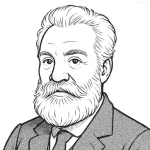“Yes, there is a terrible moral in ‘Dorian Gray’ – a moral which the prurient will not be able to find in it, but it will be revealed to all whose minds are healthy. Is this an artistic error? I fear it is. It is the only error in the book.”

- October 16, 1854 – November 30, 1900
- Irish
- Author, poet, playwright
table of contents
Quote
“Yes, there is a terrible moral in ‘Dorian Gray’ – a moral which the prurient will not be able to find in it, but it will be revealed to all whose minds are healthy. Is this an artistic error? I fear it is. It is the only error in the book.”
Explanation
In this quote, Oscar Wilde acknowledges the moral message present in his novel The Picture of Dorian Gray, while simultaneously expressing concern about how it may be perceived. He suggests that the moral in the novel might not be immediately obvious to those who are prurient—those who have a narrow, perhaps sensationalist or prudish view of morality. For “healthy minds”, however, the deeper moral of the story is clear, likely referring to themes of corruption, decay, and the consequences of living a life of excess and hedonism without regard for the moral consequences. Wilde also expresses some doubt about the way this moral comes across, admitting that this could be an artistic error—the way the message is presented might detract from the novel’s overall artistic integrity, making it more explicit than he intended.
Wilde’s comment reflects his often contradictory relationship with morality and art. On one hand, he was fascinated by the idea of moral decay and its effects on the human psyche, exploring this concept in The Picture of Dorian Gray. On the other hand, Wilde’s artistic sensibilities often pushed against the idea of didacticism in literature—he believed that art should be more about expression and aesthetic experience rather than teaching moral lessons.
In modern contexts, this quote could be understood as a commentary on the balance between art and message. Wilde seems to struggle with the idea that a moral in a work of fiction might diminish its artistic value or become too overt, particularly in a work like The Picture of Dorian Gray, where the exploration of aestheticism and morality is central. Wilde’s words encourage reflection on how morality can influence artistic works, and whether a moral lesson should be presented subtly or explicitly, especially in works meant to challenge societal norms.
Would you like to share your impressions or related stories about this quote in the comments section?


